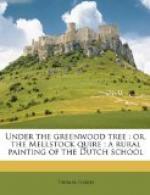As the rain and wind increased, and Fancy’s bonnet-ribbons leapt more and more snappishly against her chin, she paused on entering Mellstock Lane to consider her latitude, and the distance to a place of shelter. The nearest house was Elizabeth Endorfield’s, in Higher Mellstock, whose cottage and garden stood not far from the junction of that hamlet with the road she followed. Fancy hastened onward, and in five minutes entered a gate, which shed upon her toes a flood of water-drops as she opened it.
“Come in, chiel!” a voice exclaimed, before Fancy had knocked: a promptness that would have surprised her had she not known that Mrs. Endorfield was an exceedingly and exceptionally sharp woman in the use of her eyes and ears.
Fancy went in and sat down. Elizabeth was paring potatoes for her husband’s supper.
Scrape, scrape, scrape; then a toss, and splash went a potato into a bucket of water.
Now, as Fancy listlessly noted these proceedings of the dame, she began to reconsider an old subject that lay uppermost in her heart. Since the interview between her father and Dick, the days had been melancholy days for her. Geoffrey’s firm opposition to the notion of Dick as a son-in-law was more than she had expected. She had frequently seen her lover since that time, it is true, and had loved him more for the opposition than she would have otherwise dreamt of doing—which was a happiness of a certain kind. Yet, though love is thus an end in itself, it must be believed to be the means to another end if it is to assume the rosy hues of an unalloyed pleasure. And such a belief Fancy and Dick were emphatically denied just now.
Elizabeth Endorfield had a repute among women which was in its nature something between distinction and notoriety. It was founded on the following items of character. She was shrewd and penetrating; her house stood in a lonely place; she never went to church; she wore a red cloak; she always retained her bonnet indoors and she had a pointed chin. Thus far her attributes were distinctly Satanic; and those who looked no further called her, in plain terms, a witch. But she was not gaunt, nor ugly in the upper part of her face, nor particularly strange in manner; so that, when her more intimate acquaintances spoke of her the term was softened, and she became simply a Deep Body, who was as long-headed as she was high. It may be stated that Elizabeth belonged to a class of suspects who were gradually losing their mysterious characteristics under the administration of the young vicar; though, during the long reign of Mr. Grinham, the parish of Mellstock had proved extremely favourable to the growth of witches.
While Fancy was revolving all this in her mind, and putting it to herself whether it was worth while to tell her troubles to Elizabeth, and ask her advice in getting out of them, the witch spoke.
“You be down—proper down,” she said suddenly, dropping another potato into the bucket.




